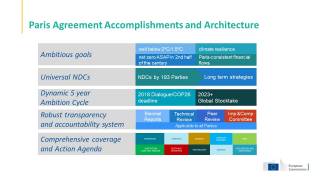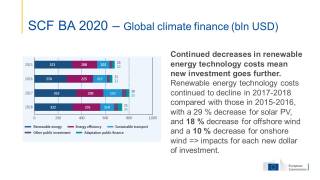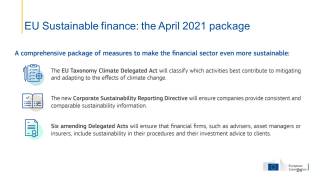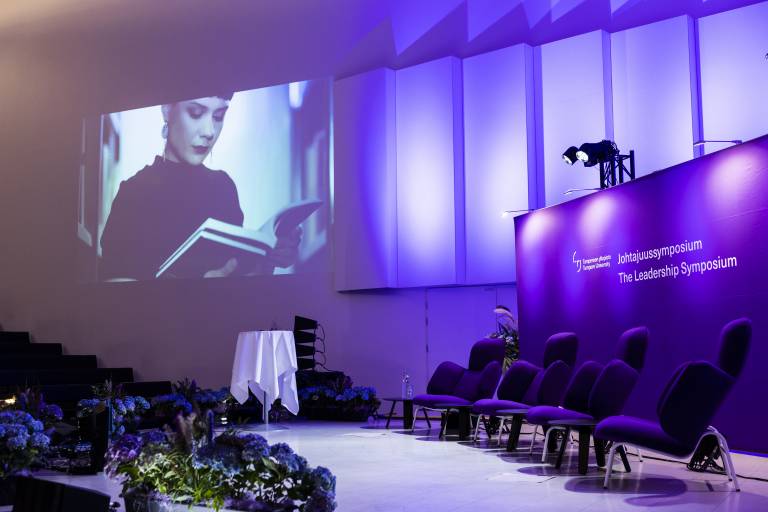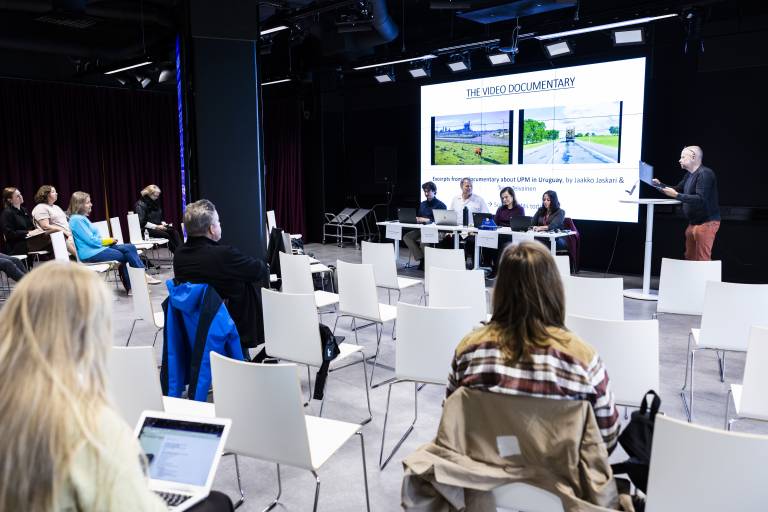Ismo Ulvila has a rich experience of working with climate issues. Previously, he has worked at the Directorate-General official for Climate Action (DG CLIMA) as an energy expert, co-chaired the United Nations Framework Convention on Climate Change (UNFCCC) Standing Committee on Finance and worked as a manager in international United Nations (UN) climate negotiations. On top of all this, he has experience of working in the European Commission’s climate desk for Latin America and the Caribbean region.
UN’s role in climate change mitigation
In the beginning of the LFC Lecture, Mr. Ulvila summarized that his presentation aimed to provide us a big picture of the critical areas in the UN climate process, tell us what other factors there are, and the importance of this (also in connection to the EU). Mr. Ulvila began his presentation by clearly articulating that even though the recent Glasgow Climate Change Conference (COP26) might have been given too much attention concerning its practical influence, the intense pressure deriving from civil society and the active participation of the private sector were exceptionally strong. Hence, sustainability is now seen as an opportunity instead of a threat and cost for many private sector actors.
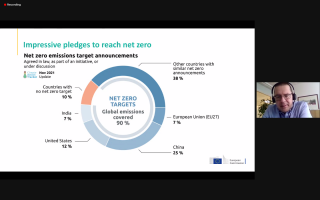
In Ulvila’s presentation, it was clarified that the goals set in COP 26 mainly were taken from the Paris Agreement, and the overarching one got back to the famous goal to limit global warming to 1,5 degrees. In addition to the climate conference, Mr. Ulvila stated that there are universal Nationally Determined Contracts that must based on the best available scientific knowledge. According to Mr. Ulvila, such achievements and climate negotiations are politically essential, but not binding. Hence, if we want to change something and create better conditions, the goals need to be implemented. On top of this, the comprehensive coverage and interests connected to these negotiations bring their own challenges, Mr. Ulvila explained. Sounds complex, right? We need experts, politicians, and actors from various fields to tackle climate issues.
For COP26, the progressive parties and the EU wanted to maintain the ambition and thus highlighted the need for adaptation, since the mitigation actions weren’t seen solely enough anymore. One of the central financial targets was the 100bn US dollars, although Mr. Ulvila highlighted that this is only a fraction of what we need in the end and that the private sector’s contribution will be crucial. Finally, the Katowice Rulebook was achieved, but it is neither a solution in itself, and there are still major open questions for the future, as Ismo mentions.
One could spot two themes in Ulvila’s lecture: firstly, a change for the better is possible, but actions must be taken urgently. Even though not all the national leaders joined the Glasgow meeting for various reasons and not all emitters are yet on board, Mr. Ulvila sees that “the big wheel is turning”. We know where the goal is, but don’t know how, when and with whom we will get there”, Mr. Ulvila elaborated. The goals are set high, but it is possible to reach them if we manage to keep up the pressure (despite all the other things going on in the world) and various actors involved. Based on his assessment, Ulvila mentioned two things that would support the change for positive: 1) the business community is on board and keep up the pressure – the need for billions of investments 2) some pricing for carbon is likely to come soon.
Global climate finance – Driver of change?
After elaboration on the general successes and the failures of the UN COP 26 meeting, Mr. Ulvila continued to the broad topic of climate finance and its role in fighting global warming. He first discussed the well-known 100bn USD promise, dating back to 2009 and the Copenhagen Climate Conference. Simplified, the 100bn promise was a commitment of developed countries to deliver 100bn USD to developing countries annually by 2020 to help them adapt to climate change and mitigate global warming. However, as Mr. Ulvila explained, the promise has not been kept. Still, as already stated, the 100bn promise has mainly been considered a “drop in the ocean,” and, e.g., the private sector’s financial contributions will play a crucial role in fighting climate change. Hence, the Glasgow Climate Pact negotiated at UN COP 26 brought both new and old commitments on Climate Finance. In addition to the 100bn goal Delivery Plan, the Glasgow Climate pact, among other measures, urged developed countries to double the adaptation finance, welcomed record contributions to the Adaptation Fund, and initiated deliberations on the New Quantified Collective Goal. Further, robust accounting rules for carbon markets were set, although it remains to be seen whether the ambitious offset mechanism meets the goals that are set for it.
However, many complicated climate finance-related gaps remained after the UN COP 26. For example, Mr. Ulvila elaborated on the support needed for Loss and Damage, a politically challenging entity that refers to the permanent loss or repairable damage, e.g., extreme weather events or slow onset events associated with climate change. As a result of the UN COP 26, the Santiago Network that provides financial and technical assistance to countries suffering from loss and damage was strengthened and again, developed countries were urged to provide better support for activities addressing loss and damage in less developed countries.
Finally, Mr. Ulvila discussed the attraction of climate-positive investments that we might see soon. By sharing the informative graph above, he demonstrated how continued decrease in renewable energy technology costs means new investments in climate change mitigation.
EU leading the way during the times of uncertainty
Finally, it is safe to say that the major global crises during the last few years have certainly impacted the climate change action. Although Mr. Ulvila often emphasized that while the EU is doing well on a general level and even aiming to lead by example with its climate diplomacy, the recent developments are also putting the EU in a new position.
Currently, the EU’s sustainable finance action plan includes several initiatives and actions implemented across the union. For example, the EU has come up with a comprehensive taxonomy regulation that develops a common EU language for environmentally sustainable activities and several other actions related to transparency of sustainability reporting. Mr. Ulvila emphasized that the EU has been relatively united in climate-related efforts during the past decade and it is an ambitious front-runner globally. The most recent EU sustainable finance package is presented in the picture below.
However, according to Mr. Ulvila, the case has not been the same in security politics, in which the EU member states have not been able to find a common direction. Now that a huge humanitarian crisis and unacceptable war has begun in Europe, the union has been forced to make fast and united decisions in defense and security politics. As Mr. Ulvila said, it has been made very clear during the past few weeks that the risk of relying on one energy supplier (Russia) is way too big to be taken.
Hence, Mr. Ulvila argued that the EU’s energy policies have now advanced more than in the last ten years. It is finally understood that climate, energy, and security politics go hand in hand. During the lecture, Mr. Ulvila also elaborated on the audience question related to the impacts of the war in terms of the energy transition. Mr. Ulvila indeed argued that the energy transition might take place faster, as the EU is accelerating the pace of giving up on the use of Russian energy. Finally, the key goal of the EU now seems to be in getting rid of energy dependency and quickly strengthening the resiliency of the energy system, which inevitably results in a better security environment as well.
Mr. Ulvila’s lecture gave many fascinating insights on climate finance, the complexity of the UN climate negotiations, and the societally overarching nature of the decisions made related to climate change. The lecture certainly reassured the sense of urgency in the climate action. As Mr. Ulvila said, we have the goals, but we are unsure how to reach them yet. Thus, we firmly believe that the need to increase the pressure on climate action with legislation and the efforts to comprehensively engage all the actors in society from governments to individuals and the private sector globally must be continued. The 1,5-degree goal needs to be reached, ensuring that no one is left behind.
The LFC Lecture with Ismo Ulvila was organized and hosted by the Leadership for Change students Ella Ahmas, Fajer Almulaifi, Leo Cantell, Niko Helin, Helia Hreblay and Shaun Micallef.


